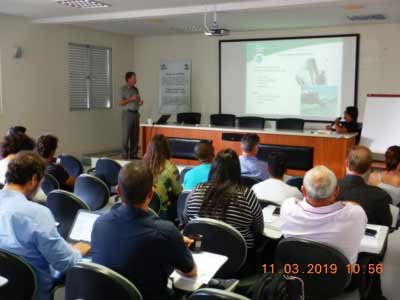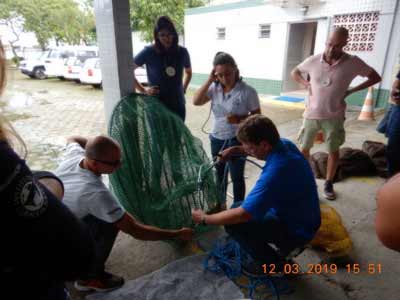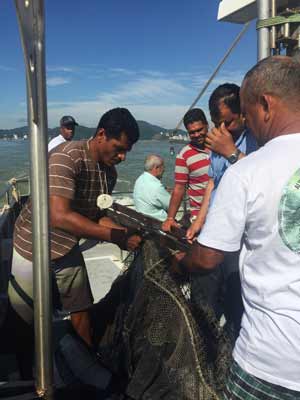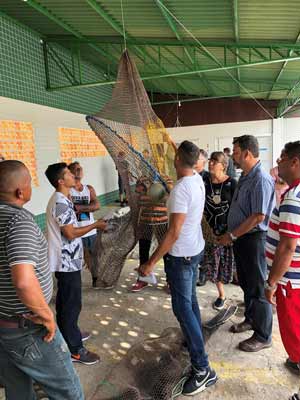REBYC Brazil receives technical visit of BRD specialist
Written by: Dérien Lucie Vernetti Duarte
The REBYC-II LAC Brazil group hosted fisheries biologist Daniel Foster, expert in bycatch reduction devices development and fisheries management from NOAA Fisheries, Mississippi. Mr. Foster came to facilitate a technical workshop with fishermen and researchers and a series of technical visits to Brazilian pilot sites.
The meeting occurred on the National Center for Research and Conservation of Marine Biodiversity in the Southeast and South of Brazil – CEPSUL/ ICMBio of the Ministry of the Environment, which is conducting experiments with BRDs in industrial and small-scale shrimp trawl fisheries from the Southeast and Southern. The objective was to share information among countries on the BRDs implementation, as well as the challenges and possible solutions for each region. The examples brought by Mr Foster were shared with fishermen, net makers, shipowners, researchers and managers from seven states of Brazil and the Aquaculture and Fisheries Secretariat of the Ministry of Agriculture, Livestock and Supply - MAPA, regions where the REBYC II - LAC project is being developed.
 |
 |
| Mr Foster's presentation. | Preparing to sew the USA TED. |
With the workshop, it was possible to compare the Brazilian BRD scenario to the USA context, since during the period of American law implementation about the use of turtle exclusion devices (TED) there was also a high rejection by the sector fishing for that measure. To avoid rejection, the institution approached fishermen in order to develop mechanisms for using the devices together. The example of integrated work was enlightening and motivating for all the participants, as it was possible to identify in the REBYC II - LAC project a great opportunity to work jointly with the productive sector. It was also possible to identify that our problems are common to management measures aimed at using BRDs, and that there are ways to overcome the barriers that are linked to these processes and overall overcome these challenges.
There were opportunities to conduct practical activities, where it was possible to build two models of turtle exclusion devices (TED) for comparison between the countries, and a field trip on board the school boat "Aprendendo com o Mar" of the Federal Institute of Santa Catarina (IFSC), to test trawl nets modified with BRDs. At the end of the meeting, the 42 participants were hopeful and willing to increase the partnership and continue BRD testing in each region.
After the meeting, Mr Foster made technical visits to four pilot sites that are conducting tests with reducing devices in the country. One of this visits was to the fykenet fisheries in Patos Lagoon estuary, where the main objective is the construction of devices to exclude fish, empowering this type of fishing, in order to ban illegal trawling in the region.
There was also a visit to the Anhatomirim protected area (APA Anhatomirim – ICMBio/MMA) where many devices were developed by the fishermen themselves to minimize the conflict between the protected area and the shrimp trawling.
In the communities of Barra de Sirinhanhém and Piaçabuçu in the northeast, Mr Foster had the opportunity to go on board local trawlers and handle the fishing gear.During all the visits, it was possible to exchange experiences with local fishermen and researchers, on how to improve the dialogue with the sector and to improve the techniques of device development. Mr. Foster has a holistic look at the use of BRDs and was instrumental in Brazil's REBYC team being able to share local experiences and learn beyond the development of BRDs.Mr Foster brought to the REBYC Brazil group insights and orientations on how we can improve the associative work and the devices tested, pointing out the changes necessary for its better functioning and acceptance.
 |
 |
| School boat about test BRDs. A fisher is sewing the net with square-mesh window. |
Fishers sewing a Brazilian TED. |
